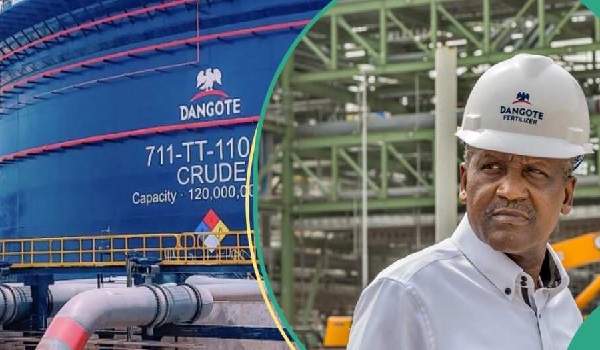Nigeria’s Dangote mega-refinery is shifting towards processing more of the country’s own crude oil while reducing imports from the United States, according to a report by Bloomberg.
Data compiled by Bloomberg shows that in the third quarter, the refinery plans to source just over 80% of its feedstock from domestic supplies, up from less than 75% in the previous quarter, based on tanker-tracking information and trader insights.
Last month, oil prices came under pressure amid reports that the refinery intended to resell some of the US crude it had previously purchased. This move highlights the significant impact Dangote is already having on Atlantic basin petroleum markets.
By scaling back overseas crude purchases, the refinery could potentially increase competition among US export barrels for buyers elsewhere. This trend may continue in the coming months, particularly as the Nigerian government introduces a new system in October that allows Dangote to purchase crude in the local currency. This plan could involve up to 445,000 barrels per day of Nigeria’s crude.
It remains uncertain how much oil will be traded under this new system, but if utilised fully, Dangote might require minimal, if any, overseas crude. The refinery, located near Lagos, has processed over 56 million barrels of crude since December during test runs and a gradual increase in processing capacity, with 78% of this being sourced locally.
While a senior Dangote official declined to comment on future crude procurement strategies, a company spokesperson confirmed that the refinery has secured six cargoes of crude directly from the Nigerian National Petroleum Company Limited (NNPC) for the coming month. Each Nigerian cargo typically holds about 1 million barrels.
Additionally, two more shipments from Nigeria and 2 million barrels of WTI Midland are expected to arrive in September, according to tanker-tracking data. On average, the plant will have processed nearly 10 million barrels per month over the six months leading up to September.
Despite expectations for a significant increase in American crude imports earlier this summer, some US barrels purchased for this month and next are being resold, according to a Dangote Industries official in July. The refinery also canceled two tenders for an additional 6 million barrels of American crude for September, traders reported. These changes could also reduce the availability of Nigerian crude for sale to European and Asian markets.
Meanwhile, the 650,000-barrel-per-day Dangote refinery is currently undergoing test runs for petrol production, with full operations expected by mid-September, as reported by industry monitor IIR Energy.
The $20 billion refinery, built by Africa’s richest man, Aliko Dangote, near Lagos, began operations in January after years of delays. It has mainly produced diesel and other distillate fuels so far, with plans to start petrol production initially scheduled for May and later postponed to July. Further delays are possible, according to IIR. Efforts to contact Dangote for comments were unsuccessful.
Once fully operational, the refinery is poised to disrupt the Europe-to-Africa fuel trade and reduce Nigeria’s dependency on imported refined products.
In other news, oil prices stabilised yesterday as a drop in US fuel inventories provided support after four days of declines due to concerns over global demand. Brent crude futures rose by 29 cents, or 0.4%, to $76.34 per barrel, while US West Texas Intermediate crude futures increased by 43 cents, or 0.6%, to $72.36 per barrel. The market had slumped on Wednesday following revisions to US jobs data, which added to concerns about oil demand amid weak economic data from China, the world’s largest oil importer. The United States remains the world’s biggest oil consumer.



